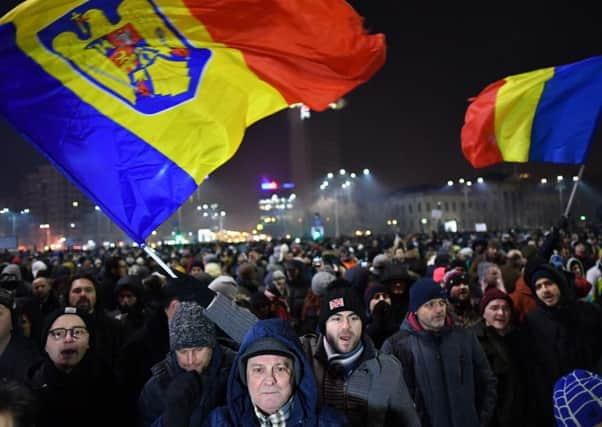Protests as Romanian government decriminalises official misconduct


Protests were planned for cities including Bucharest, Cluj and Sibiu after protesters stayed up all night in opposition to the “emergency ordinance” published at 1am local time yesterday morning, which European Union leaders said they were following “with great concern”.
Romanians flooded the streets throughout the night, chanting and holding placards.
Advertisement
Hide AdAdvertisement
Hide AdCritics believe the law, which will decriminalise cases of official misconduct in public office in which the damages are valued at less than 200,000 leu (£37,000), will benefit members of the government – led by the Social Democratic party, which was elected in November – some of whom are currently under investigation for fraud.
The National Anti-Corruption Directorate (DNA) has launched 1,170 prosecutions in the past three years in a nationwide anti-corruption drive, in cases which cost the state more than €1bn. Its chief prosecutor, Laura Kovesi, claims that the new law could affect one in three of these.
Protesters have claimed that the marches planned for cities across the country will be the biggest since the Revolution of 1989, which saw dictator Nicolae Ceausescu killed by firing squad on Christmas Day.
Romanian president Klaus Iohannis, who was elected in 2014 on an anti-corruption ticket, but has little real power to make changes, called the measure’s adoption “a day of mourning for the rule of law”. He has previously pledged to hold a referendum over a separate law which would see prisoners serving sentences shorter than five years – excluding rapists and multiple offenders – freed in what the government claims is a move to ease prison overcrowding.
Dora Pop, from Cluj-Napoca, Romania’s second city, told The Scotsman: “Everybody is beyond angry, disgusted. We’ll make history. It’s the first time since the Revolution that we have such an impressive number of protesters. We’re aiming for the second one.”
Leaders of the centre-left Social Democratic Party and the junior Alliance of Democratic Liberals, which form the current coalition government, both face corruption charges that bar them from serving as ministers.
Social Democrat chairman Liviu Dragnea was unable to become prime minister because in April 2016 he received a two-year suspended jail sentence for vote rigging.